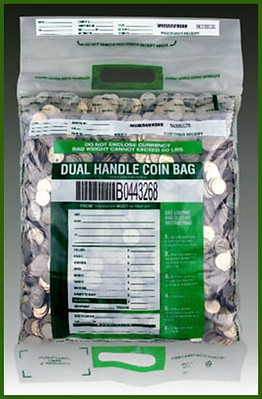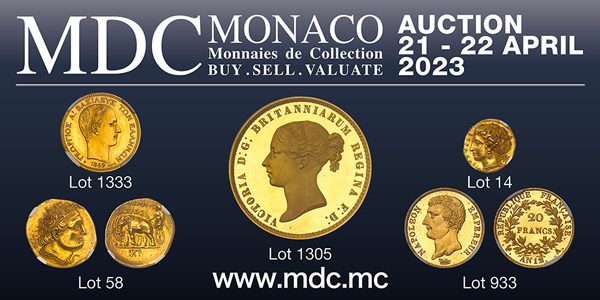
PREV ARTICLE
NEXT ARTICLE
FULL ISSUE
PREV FULL ISSUE
MODERN PLASTIC COIN BAGSE-Sylum Feature Writer and American Numismatic Biographies author Pete Smith submitted this article with a modern twist on his recent coin bag topic. Thanks! -Editor
Modern Plastic Coin Bags
We did business with a commercial bank that had a coin counting machine. I poured coins into a hopper and the machine sorted them, counted them and dropped them into clear plastic bags. Usually, one of the bags would get full and the machine stopped so the bag could be replaced. I think there were two bags for each denomination in the machine and a bank clerk would take out the full bags and replace them with new empty bags. The machine had bags for the current small sized dollars. Larger Eisenhower dollars were rejected and dropped into a box inside the door of the machine. I learned to ask the clerk to check for these because these were not included in the tally. The Eisenhower dollars were an annoyance for the bank because they just accumulated and did not circulate. The full bags were picked up by an armed security service that processed large volumes of coins for their customers. These operate independently from the Federal Reserve System. A banker friend indicated that their service provider was a secret operating at an undisclosed location. The plastic coin bags held the same capacity as the older cloth bags.
The bags did not need to be full and the quantity would be written on the bag. I was amused to note that
the bags were marked for Bags may be ordered from banking service companies in quantities at less than $1 per bag. The bags have an adhesive strip to seal the bag. Unlike the reusable cloth bags, these bags are cut when opened and are not reusable. I am aware of these brand-named bags:
My interest is in large bags similar to the old cloth bags. Since they are not reusable, the modern plastic coin bags serve a different purpose than the vintage cloth bags. There are many kinds of smaller plastic bags that can be sealed during transport for banking deposits. The traditional cloth bags printed with the name of the U. S. Mint were sewn shut and used to ship new coins from the Mint. Thus, the concept of an unsearched Mint sewn bag. Way back in the Twentieth Century, large quantities of coins were taken out of parking meters and collected from fare boxes on busses. These would be sent to the Federal Reserve Banks and might be placed in cloth bags imprinted with the name of the various Federal Reserve Banks. These bags of mixed used coins would be shipped to customers. Thousands of local banks had their names printed on cloth bags that could be used to provide coins for customers and for customers to send coins in for deposits. I have also seen bags printed with the names of transit companies and casinos. Many coin dealers had their names printed on cloth bags. Our company used imprinted cloth bags to ship 90% silver coins, wheat cents, bulk world coins or anything similar. We also used plastic zip-lock bags and other strong plastic bags for shipments. All the printed cloth bags are collectable. Are the plastic bags collectible? Well, I currently have two in my collection but I suspect that is unusual. Here in the big city, fare boxes and parking meters have card readers. Coins may be becoming obsolete. Perhaps some future numismatic historian will find this article and appreciate that I documented the current usage of plastic coin bags. Indeed - as I often say, the time to collect and document numismatic history is at the time it's being made. Thanks, Pete! -Editor
To read the earlier E-Sylum articles, see:
Wayne Homren, Editor The Numismatic Bibliomania Society is a non-profit organization promoting numismatic literature. See our web site at coinbooks.org. To submit items for publication in The E-Sylum, write to the Editor at this address: whomren@gmail.com To subscribe go to: https://my.binhost.com/lists/listinfo/esylum All Rights Reserved. NBS Home Page Contact the NBS webmaster 
|

